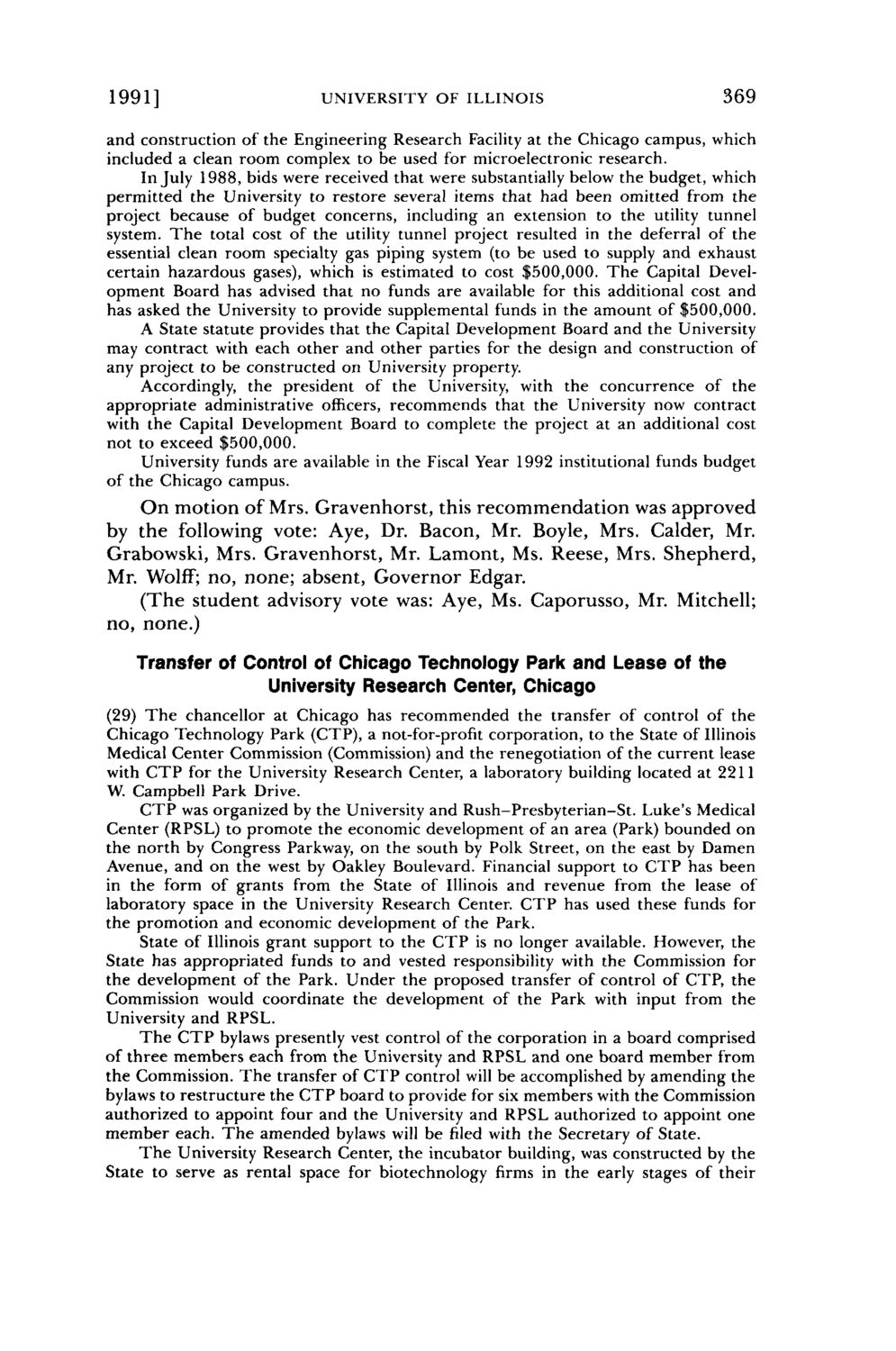| |
| |
Caption: Board of Trustees Minutes - 1990
This is a reduced-resolution page image for fast online browsing.

EXTRACTED TEXT FROM PAGE:
1991] UNIVERSITY OF ILLINOIS 369 and construction of the Engineering Research Facility at the Chicago campus, which included a clean room complex to be used for microelectronic research. In July 1988, bids were received that were substantially below the budget, which permitted the University to restore several items that had been omitted from the project because of budget concerns, including an extension to the utility tunnel system. T h e total cost of the utility tunnel project resulted in the deferral of the essential clean room specialty gas piping system (to be used to supply and exhaust certain hazardous gases), which is estimated to cost $500,000. T h e Capital Development Board has advised that no funds are available for this additional cost and has asked the University to provide supplemental funds in the amount of $500,000. A State statute provides that the Capital Development Board and the University may contract with each other and other parties for the design and construction of any project to be constructed on University property. Accordingly, the president of the University, with the concurrence of the appropriate administrative officers, recommends that the University now contract with the Capital Development Board to complete the project at an additional cost not to exceed $500,000. University funds are available in the Fiscal Year 1992 institutional funds budget of the Chicago campus. On motion of Mrs. Gravenhorst, this recommendation was approved by the following vote: Aye, Dr. Bacon, Mr. Boyle, Mrs. Calder, Mr. Grabowski, Mrs. Gravenhorst, Mr. Lamont, Ms. Reese, Mrs. Shepherd, Mr. Wolff; no, none; absent, Governor Edgar. (The student advisory vote was: Aye, Ms. Caporusso, Mr. Mitchell; no, none.) Transfer of Control of Chicago Technology Park and Lease of the University Research Center, Chicago (29) T h e chancellor at Chicago has recommended the transfer of control of the Chicago Technology Park (CTP), a not-for-profit corporation, to the State of Illinois Medical Center Commission (Commission) and the renegotiation of the current lease with C T P for the University Research Center, a laboratory building located at 2211 W. Campbell Park Drive. C T P was organized by the University and Rush-Presbyterian-St. Luke's Medical Center (RPSL) to promote the economic development of an area (Park) bounded on the north by Congress Parkway, on the south by Polk Street, on the east by Damen Avenue, and on the west by Oakley Boulevard. Financial support to CTP has been in the form of grants from the State of Illinois and revenue from the lease of laboratory space in the University Research Center. CTP has used these funds for the promotion and economic development of the Park. State of Illinois grant support to the CTP is no longer available. However, the State has appropriated funds to and vested responsibility with the Commission for the development of the Park. Under the proposed transfer of control of CTP, the Commission would coordinate the development of the Park with input from the University and RPSL. T h e C T P bylaws presently vest control of the corporation in a board comprised of three members each from the University and RPSL and one board member from the Commission. T h e transfer of CTP control will be accomplished by amending the bylaws to restructure the C T P board to provide for six members with the Commission authorized to appoint four and the University and RPSL authorized to appoint one member each. T h e amended bylaws will be filed with the Secretary of State. T h e University Research Center, the incubator building, was constructed by the State to serve as rental space for biotechnology firms in the early stages of their
| |